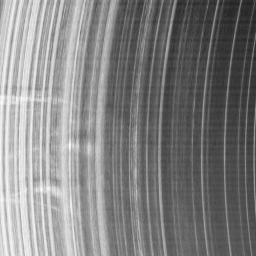Old spokes never die, they just fade away. That is the current thinking of scientists who study these ephemeral features in Saturn's rings.
This "difference image" is actually a composite of two images of the B ring, taken about 45 seconds apart. The view illustrates how the several spokes imaged here moved between exposures. The spokes were bright against the rings in both original images, but the brightness of the earlier image was reversed so that the spoke movement is easy to discern. The "dark" image of the spokes was taken first, thus rotation in the scene is toward the bottom.
The topmost spoke is about 2,500 kilometers (1,550 miles) long and about 600 kilometers (370 miles) wide. The separation between the top spoke and the bottom one is about 8,500 kilometers (5,300 miles).
The available evidence seems to indicate that spokes are radial when generated and then shear out as they orbit the planet, eventually dispersing and fading out after about three and one-half hours.
All of these spokes are nearly radial on their trailing (top) edges, except for the thin, bottommost spoke. That spoke and the wedge-shaped one above it have a shear of about 38 degrees, meaning they have an age of about two and one-quarter hours, assuming they were first radial and then sheared their entire lives.
The faint horizontal banding in the image is due to "noise" in the spacecraft electronics that was picked up by the camera system and enhanced by the processing technique used here.
This view looks toward the unlit side of the rings from about 32 degrees above the ringplane.
The two images were taken with the Cassini spacecraft narrow-angle camera on Nov. 1, 2006 at a distance of approximately 1.7 million kilometers (1.1 million miles) from Saturn and at a Sun-Saturn-spacecraft, or phase, angle of 162 degrees. Image scale on the sky at the distance of Saturn is 10 kilometers (6 miles) per pixel.
For more information about the Cassini-Huygens mission visit http://saturn.jpl.nasa.gov/home/index.cfm. The Cassini imaging team homepage is at http://ciclops.org.

 Planetary Data System
Planetary Data System












